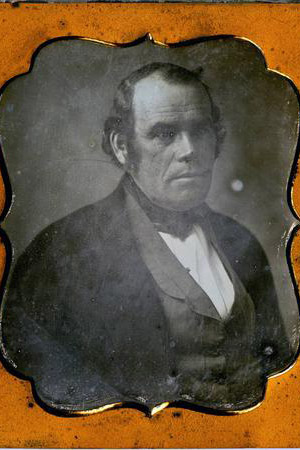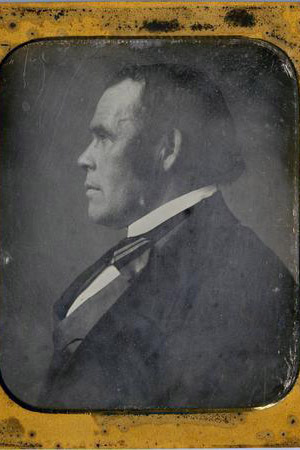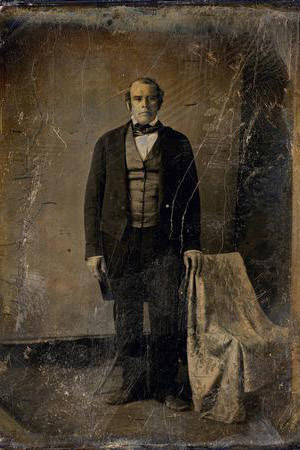Elder Parley P. Pratt’s Life Explored in Symposium
Contributed By R. Scott Lloyd, LDS Church News staff writer

Elder Craig A. Cardon, standing right, receives from his cousin Mitchell O. Pratt a vial of soil taken from the gravesite of Elder Parley P. Pratt near Van Buren, Arkansas. Elder Cardon was the keynote speaker and Brother Pratt a presenter at the 2015 Historical Symposium presented by the National Society of the Sons of Utah Pioneers.
Article Highlights
- The life of Elder Parley P. Pratt was celebrated at the 2015 Historical Symposium presented in Salt Lake City by the National Society of the Sons of Utah Pioneers.
- Four of Elder Pratt’s descendants—including Elder Craig A. Cardon—and one Church scholar spoke.
- They recounted Elder Pratt’s noteworthy and tireless ministry in the early years of the restored Church.
“[Elder Parley P. Pratt was] a prolific proclaimer of the restored gospel of Jesus Christ, an indefatigable defender of truth, an uncompromising disciple of God’s divine will.” —Elder Craig A. Cardon of the Seventy, great-great-grandson of Elder Pratt
The life of Elder Parley P. Pratt—Apostle, preacher, prolific poet, and tireless champion of the kingdom of God on earth in the early years of the Restoration—was celebrated in speech and song May 9 by four of his descendants (including a General Authority) and one Church history scholar at the 2015 Historical Symposium presented in Salt Lake City by the National Society of the Sons of Utah Pioneers.
Elder Craig A. Cardon of the Seventy, a great-great-grandson of Elder Pratt, was the keynote speaker at an evening banquet for the symposium. Earlier in the day, attendees heard from the following presenters:
Matthew J. Grow, director of publications at the Church History Department, a general editor of the Joseph Smith Papers, and great-great-grandson and coauthor of a biography of Elder Pratt.
Alexander L. Baugh, professor of Church History and Doctrine at BYU with a specialty in the Missouri period of Church History (1831–39).
Robert Steven Pratt, author of several books on Elder Pratt’s papers, a great-great-grandson of Elder Pratt, and an author of a forthcoming book on Elder Pratt’s hymn texts. His presentation was accompanied by the Kaye Starr Singers.
Mitchell O. Pratt, a great-great-grandson of Elder Pratt, author of a forthcoming book on his life and death, and leader of the archaeological team that excavated Elder Pratt’s gravesite in Arkansas.
Elder Cardon, who referred to his ancestor affectionately as “Grandpa Parley,” extolled him as an ordained Apostle and “prolific proclaimer of the restored gospel of Jesus Christ, an indefatigable defender of truth, an uncompromising disciple of God’s divine will. He was an author, an editor, a husband, and a father. He lived his life with complete faith in the Lord Jesus Christ. He died firmly rooted in that faith. Thanks be to God for this great son.”

Parley P. Pratt. Courtesy Church History Library.

Parley P. Pratt. Courtesy Church History Library.

Parley P. Pratt. Courtesy Church History Library.
Elder Cardon shared Elder Pratt’s 1839 testimony of the Prophet Joseph Smith and what he learned from him:
“He taught me many great and glorious principles concerning God and the heavenly order of eternity. It was at this time that I received from him the first idea of eternal family organization, and the eternal union of the sexes in those inexpressibly endearing relationships which none but the highly intellectual, the refined and pure in heart know how to prize, and which are at the very foundation of everything worthy to be called happiness. …
“It was Joseph Smith who taught me how to prize the endearing relationships of father and mother, husband and wife; of brother and sister, son and daughter.
“It was from him that I learned that the wife of my bosom might be secured to me for time and all eternity; and that the refined sympathies and affections which endeared us to each other emanated from the fountain of divine eternal love. It was from him that I learned that we might cultivate these affections and grow and increase in the same to all eternity; while the result of our endless union would be an offspring as numerous as the stars of heaven or the sands of the sea shore.”
Brother Grow called Elder Pratt “the Apostle Paul of Mormonism,” an allusion to his extensive travels and tireless defense of the faith.
Brother Grow recounted that in conversation with a long-lost friend from his youth, Elder Pratt said he had “traveled widely throughout the United States and Canada, led Mormon pioneer companies past the ‘moving masses of wild buffalo on the boundless, treeless plains’ to Utah, preached in San Francisco during the Gold Rush, crossed the Atlantic Ocean six times and eaten ‘figs from the tree’ in Chile. His life had been one of extremes, of ‘poverty and riches, peace and war,’ sublime joys and devastating sorrows.”
Brother Baugh spoke of Elder Pratt’s imprisonment in connection with the confinement of the Prophet Joseph Smith and other Church leaders following three months of conflict between Mormons and Missouri mobs and militia members in 1838. The Prophet’s confinement would last five and a half months, and Elder Pratt would remain imprisoned three months beyond that.
It was during their three-week confinement with other Church leaders in a log house at Richmond, Missouri, that Joseph issued a scathing rebuke of the militia guards, who had been boasting of atrocities committed again the Mormon people, Brother Baugh recounted.
“Elder Pratt did not record the reprimand at that time or even soon after,” he said. “It was not until 1853 that he wrote the letter to Willard Richards, Church Historian, recounting the incident. The letter would be published in the Deseret News November 12, ironically 15 years to the day that the Richmond hearing began. Still later, the portion of the letter that included the Prophet’s scathing rebuke of the militiamen was included in his autobiography. … To this day, perhaps no other writer has captured the Prophet’s personal valor and courage quite like Elder Pratt.”
Robert Steven Pratt narrated a selection of hymns performed by the Kaye Starr Singers, the texts of which were written by Elder Pratt.
“Parley P. Pratt, primary author of several seminal verses of the Restoration, utilized his poetic gifts to give a voice to the revelatory and other experiences of the early Latter-day Saint movement,” he said. “He considered himself a wandering pilgrim set forth to preach to a fallen world. During his many missions he would render much of the experience in poetic form.
“Parley published two books of poems titled The Millennium. The books consist of a narrative poem of six chapters, plus several hymns. These poems were utilized for various hymnals and other settings.
“Called ‘the poetic Apostle,’ Parley had 65 of his poems present in various LDS hymnals. Three were in the first hymnal in 1835. With the publication of the 1840 Manchester hymnal, he added 48 hymns, which were primarily compiled by him. That became the major hymnal for the Latter-day Saints through 25 editions. For example, the 1927 hymnal contains 38 of Parley’s hymns; our present hymnal has only seven.”
Mitchell O. Pratt spoke of Elder Pratt’s assassination in May 1857, shortly after his 50th birthday, outside the small town of Van Buren, Arkansas. He also told of the excavation of his burial site in Arkansas in April 2008, carried on at the behest of the association of Elder Pratt’s descendants, who wanted to fulfill his dying request that he be buried among his family in Utah.
No identifiable human remains were found, probably due to the acidity of the soil and the passage of time, Brother Pratt said. But a change in texture of the soil during the digging gave evidence of where the grave was.
“The male descendants of Parley, who held the Melchizedek Priesthood, had an experience, and it was earth-shattering,” he said, adding that they strongly felt this was the grave of Elder Pratt “and that this was a time of reconciliation, peace, and oneness with the people of Arkansas.”
He added, “The whole experience was never about the physical, though we didn’t know that going in. It was all about the spiritual, because hearts were changed.”
Not long after that event, missionary work in Arkansas was at an all-time high, he said, a tribute to Elder Pratt, a great missionary of this gospel dispensation.
